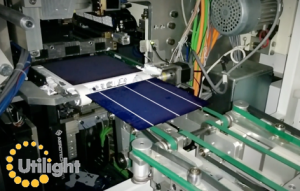Israeli 3D laser printing developer Utilight Ltd. has raised $2.9 million. The company’s non-contact 3D laser printing technology is for high-volume manufacturing of printed electronics including PV solar cells. The new investors include a strategic investor in Israel (from the polymers’ industry), SCI Advanced Technology Fund and high net worth Asian investors. The new investors join current investors including Robert Bosch Venture Capital (RBVC), Waarde Capital and I2BF Global Venture. The company has also received $3 million in grants from Israel’s Office of the Chief Scientist (OCS) and plans marketing a $15 million Series B financing in the second quarter of 2016.
Based in Yavne, Utilight develops and markets its PTP™ technology, a disruptive non-contact 3D laser printing technology for high-volume manufacturing of printed electronics including PV solar cells. The Company will use the latest financing to target and market to the world’s top 20 global PV manufacturers. TriPoint Global Equities LLC acted as placement agent and advisor for the transaction. The company was founded in 2009 by chairman and CEO Dr. Giora Dishon, Amir Noy, Misha Matusovsky and Moshe Finarov. Dr. Dishon was the founder and former CEO of Nova Measuring Instruments Ltd. Dr. Dishon said, “We intend to use the proceeds from this financing to aid in accelerating Utilight’s plan to move from beta testing to market proliferation.”
Sources globes.co.il
Investors include Robert Bosch Venture Capital (RBVC), I2BF Global Ventures and Waarde Capital BV.
Solar photovoltaic company Utilight has raised $4.5 million in a Series A financing round from investors that include Robert Bosch Venture Capital (RBVC), I2BF Global Ventures and Waarde Capital BV. The proceeds will be used to develop the company’s wafer-metallization technology.
Wafer-metallization is the process of applying a conducting metal layer onto a solar photovoltaic cell. The current method that dominates the market is Screen Printing (SP), but this method, according to Utilight, has significant barriers in solar photovoltaic cell manufacturing: in reducing line width, excessive usage of silver paste, exerting excess pressure on the wafers and is suboptimal for maximum electric output of photovoltaic cells and panels. Based in Yavne, the company was founded in 2009 by chairman and CEO Dr. Giora Dishon, Amir Noy, Misha Matusovsky and Moshe Finarov. Utilight has developed an innovative, patent pending, non-contact printing method, Pattern Transfer Printing (PTPTM), for high-volume manufacturing of solar photovoltaic cells, which both eliminates the manufacturing drawbacks and is more economical than available SP methods.
The PTP process enables depositing finer lines with high aspect ratio and yields higher efficiency of solar photovoltaic cells. 12BF partner and head of research Alex Belyakov said, “Utilight brings solar photovoltaic cell manufacturers exactly what they need – manufacturing efficiency and higher performance of their products.” Gadi Toren, RBVC venture capital investment partner will join Utilight’s board of directors. He said, “We are backing an experienced team with an impressive track record in production processes of advanced technologies.” Managing partner at Waarde Capital Ays Sharaev said, “This project has all elements that are crucial for success: very experienced team, strong interest of potential clients, innovative technology and business model, and professional co-investors. Waarde Capital is glad to co-invest alongside with RBVC and I2BF in other projects in Israel and other countries.”
——
Revolutionary Laser 3D Technology – A new age of Printing for Solar Cells & Electronics
Striving towards a brighter future, Utilight’s innovative technology aims to increase solar cell efficiency and reduce material use, reducing the cost per watt of solar electricity. As todays leading PV (Photovoltaic) cell manufacturers have reached the limits of conventional screen printing metallization processes for solar cells; PV manufacturers must adopt new ways to promise substantial efficiency gains in order to be competitive within this thriving market.
Efficiency increase: Utilight has developed an innovative disruptive technology and named it PTP™ (pattern transfer printing), which is a game changing functional printing method, applicable for high-volume manufacturing of solar PV cells.
PTP™ prints patterned features with high aspect ratios (e.g. 25µ width and 15µm height) using this revolutionary patent pending light induced deposition technology, which is also non-contact and high throughput, enabling an immediate increase in solar cell conversion efficiency (lower shadowing effect) while using standard industry pastes and processes. Cost reduction: PTP™ non-contact accurately aligned printing (e.g. ±10µm for selective emitter (SE)), while increasing conversion efficiency, enables cost reduction through significant reduction of the amounts of silver paste used, eliminating wafer breakage and enabling the use of thinner wafers, thus dramatically lowering the costs of cells and modules (in $/Wp).
HVM Ready: Changing Everything without Changing Your Operation: While PTP™ uses a revolutionary approach towards the metallization of c-Si PV cells; its implementation is designed for a quick and smooth assimilation within existing High Volume Manufacturing (HVM) production lines – using the same metal pastes and production sequences and maintaining cell durability and bankability. That makes Utilight’s PTP™ HVM Ready. Using PTP™ in your production allows changing everything yet hardly changing anything at all. PTP™ eliminates current manufacturing drawbacks, raising the bar beyond the capabilities of conventional screen printing and taking the PV industry’s roadmap (ITRPV) 5 years ahead.



















